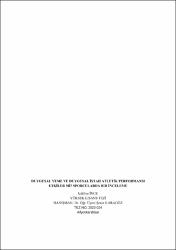Duygusal yeme ve duygusal iştah atletik performansı etkiler mi? Sporcularda bir inceleme
Abstract
Duygusal iştah ve duygusal yeme davranışları günümüzde birçok alanda dikkat çekmekte ve araştırılmaktadır. Duygusal yeme, kişilerin değişik zamanlarında hissettikleri olumlu ya da olumsuz duygularla başa çıkabilmek için yemek yeme isteği olarak ifade edilmektedir. Sporculuk mental ve fiziksel yüklenmelerle performansı artırmayı amaçlayan bir süreçtir ve bu süreçte olumlu olumsuz duygular yaşanmaktadır.
Bu çalışmanın amacı sporcuların duygusal yeme ve duygusal iştah durumlarının tespiti, performansları ve başarıları üzerine etkilerini belirlemek ve duygusal yeme düzeyleri üzerinde duygusal iştah ve besin bilgisi düzeylerinin ne kadarının açıklandığını ortaya koymaktır.
Araştırmada nicel araştırma yöntemi kullanılmış olup betimsel ve ilişkisel tarama modelinde tasarlanmıştır. Çalışmanın örneklemini; Afyonkarahisar ve çevre illerde 18-30 yaş aralığında 129 erkek ve 92 kadın (Ortyaş=23,55±3,96) farklı branşlardan toplam 221 sporcu oluşturulmuştur. Veri toplama aracı olarak, araştırmacı tarafından hazırlanan kişisel bilgi formu, sporcuların performanslarını belirlemek için atletik performansınızı nasıl değerlendirirsiniz sorusunu (1-9 dereceli soruyla), branştaki başarı durumunu belirlemek için branşınızda ki başarınızı nasıl değerlendirirsiniz sorusunu (1-9 dereceli soruyla), Demirel ve arkadaşları (2014) tarafından Türkçeye uyarlaması yapılan “Duygusal İştah Anketi”, Arslantaş ve arkadaşları (2020) tarafından Türkçeye uyarlaması yapılan “Duygusal Yeme Ölçeği”, Ongün ve arkadaşları tarafından geliştirilen “Beslenme Bilgi Ölçeği” kullanılmıştır. Araştrmada elde edilen verilerinde analizi SPSS paket programı kullanılmıştır. Verilerin çözümünde bağımlı değişkenler üzerinde demografik değişkenlerin etkilerini araştırmak için CR&T analizinden yararlanılmıştır. Değişkenler arasındaki ilişkileri test etmek için Pearson Korelasyon testinden yararlanılmıştır. Bağımlı değişkenlerin birbirlerinin anlamlı açıklayıcısı olup olmadığını belirlemek için ise, regresyon analizinden yararlanılmıştır.
Araştırmaya katılan sporcuların duygusal yeme puan ortalamaları 2,01±0,50, duygusal iştah 4,72±1,47 ve beslenme bilgisi 2,63±0,31 puan olarak tespit edilmiştir. Duygusal yeme davranışları sporcuların cinsiyet değişkenine göre kadın sporcular lehine (4,79±1,56.9 ) p<0,05, BMI kategorilerine göre ideal kilonun çok üstünde olan sporcuların lehine (3,00±0,32), spor branşlarına göre basketbolcuların (2,28±0,66) p<0,05 lehine Duygusal yeme puanları yüksek bulunmuştur. Duygusal iştah durumlarının BMI kategorilerine göre ideal kilonun çok üstünde olanlar lehine (6,44±1,72) p<0,05, sporculuk düzeyleri durumuna göre elit sporcuların duygusal iştah durumları (5,79±1,99) p<0,05 yüksek bulunmuştur. Duygusal iştah, duygusal yeme r=0,296 (p<0.001) ve beslenme bilgi düzeyleri arasında r=0,236 (p<0,001) pozitif yönlü düşük ilişki tespit edilmiştir. Sporcuların duygusal yeme düzeyleri üzerinde duygusal iştah ve besin bilgisi düzeylerinin etkilerini araştırmak için kurulan regresyon modelinin istatistiksel olarak anlamlı bulunmuştur.
Bu bulgular sonucunda Sporcuların duygusal yeme ve duygusal iştahın performanslarında ve başarılarında anlamlı bir etkiye sahip olduğu duygusal iştah arttıkça duygusal yeme davranışlarının da arttığı ve bu anlamda branşlar arasında ve sporculuk düzeyleri arasında yeme davranışlarında farklılıklar olduğu ortaya konmuştur. Emotional appetite and emotional eating behaviours attract attention and research in many fields today. Emotional eating is defined as the desire to eat in order to cope with the positive or negative emotions that people feel at different times. Sportsmanship is a process that aims to increase performance with mental and physical loads and positive and negative emotions are experienced in this process.
The aim of this study is to determine the emotional eating, emotional appetite and nutritional knowledge of athletes, to determine their effects on their performance and success, and to reveal how much of emotional appetite and nutritional knowledge levels are explained on emotional eating levels.
Quantitative research method was used in the study and it was designed in descriptive and relational screening model. The sample of the study consisted of a total of 221 athletes from different branches in Afyonkarahisar and neighbouring provinces, 129 male and 92 female (mean age=23,55±3,96) between the ages of 18-30. As a data collection tool, personal information form prepared by the researcher, the question of how do you evaluate your athletic performance to determine the performance of the athletes (with 1-9 graded questions), the question of how do you evaluate your success in your branch to determine the success status in the branch (with 1-9 graded questions), "Emotional Appetite Questionnaire" adapted into Turkish by Demirel et al. (2014), "Emotional Eating Scale" adapted into Turkish by Arslantaş et al. (2020), "Nutrition Information Scale" developed by Ongün et al. SPSS package programme was used to analyse the data obtained in the study. In the analysis of the data, CR&T analysis was used to investigate the effects of demographic variables on dependent variables. Pearson Correlation test was used to test the relationships between variables. Regression analysis was used to determine whether the dependent variables are significant explanators of each other.
The mean emotional eating scores of the athletes participating in the study were 2,01±0,50, emotional appetite 4,72±1,47 and nutritional knowledge 2,63±0,31 points. Emotional eating behaviours were found to be high in favour of female athletes (4,79±1,56.9 ) p<0,05 according to the gender variable of the athletes, in favour of athletes who were well above the ideal weight (3,00±0,32) according to the BMI categories, and in favour of basketball players (2,28±0,66) p<0,05 according to the sports branches. According to the BMI categories of emotional appetite, in favour of those who were well above the ideal weight (6,44±1,72) p<0,05, according to the level of sportsmanship, the emotional appetite of elite athletes (5,79±1,99) p<0,05 was found to be high. A low positive relationship was found between emotional appetite, emotional eating r=0,296 (p<0.001) and nutrition knowledge levels r=0,236 (p<0,001). The regression model established to investigate the effects of emotional appetite and nutritional knowledge levels on emotional eating levels of athletes was found to be statistically significant.
As a result of these findings, it was revealed that emotional eating and emotional appetite have a significant effect on the performance and success of athletes, emotional eating behaviours increase as emotional appetite increases, and in this sense, there are differences in eating behaviours between branches and between athletic levels.
Collections
- Yüksek Lisans Tezleri [635]



















